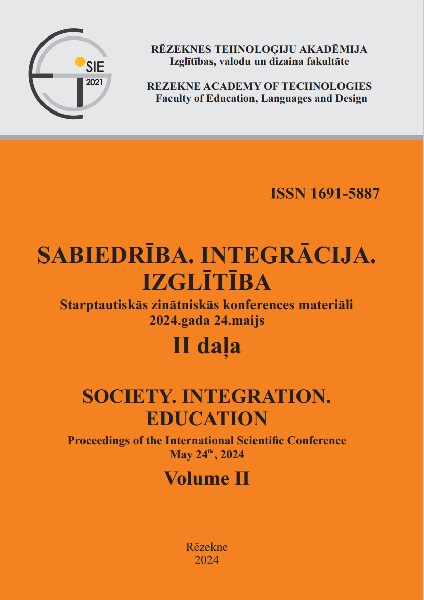THE EXPERIENCES OF SIGHTED PEOPLE IN COMMON SOCIO-CULTURAL ACTIVITIES WITH BLIND PEOPLE
DOI:
https://doi.org/10.17770/sie2024vol2.7789Keywords:
blind, inclusion, sighted, socio-cultural activitiesAbstract
The organisation of joint hikes for the blind and sighted is a completely new and untouched topic, the study of which can help to discover unexpected results, to show the significance and benefits of such activities not only for the blind but also for the sighted, their perception, new inner experiences, discoveries. Joint socio-cultural activities are not only a medium for the empowerment of the disabled, but also the education of empathic members of society and the promotion of new programs. The aim of the research is to reveal the experiences of sighted people participating in joint hikes with blind people. Semi-structured interviews were used to collect qualitative data. The research participants were 8 sighted people who had participated in joint hikes with the blind people. Thematic analysis was conducted. The experiences of the sighted and the blind have revealed that joint walks “erase” all differences, all borders. Sighted people see and learn what visual impairment is, what kind of world blind people live in – this brings them even closer to their comrades and encourages the desire to extend their friendship.
References
Bandukda, M., Holloway, C., & Singh, A. (2020). Places: A Framework for Supporting Blind and Partially Sighted People in Outdoor Leisure Activities. Technology-mediated nature engagement for blind and partially sighted people, 8, 2-20.
Berger, P. L., & Luckmann, Th. (1999). The social construction of reality:A treatise in the sociology of knowledge. Vilnius: Pradai.
Gudzinskiene, V., & Driskiene, A. (2016). Meeting the needs of people with mental illness through employment activities. Social work, 14(2), 174-187.
Gomez-Marti, M.B. (2019). Hiking Tourism in Spain: Origins, Issues and Transformations. Sustainability, 11, 2-13.
Kudryatseva, M.E., & Lebedeva, S.S. (2022). Proffesional Activities of Disabled People as a Factor of the Development of Education in an Inclusive Society. Diskurs, 8 (2), 53-65.
Mirzajonova, E. T. (2022). To the Question of the Effectiveness of Socio-Cultural Adaptation of Children With Special Needs. Spectrum Journal of Innovation, Reforms and Development, 2, 89-94.
Mitten, M.P., Overhold, P.D., Haynes , F.I. et al. (2018). Hiking: A Low-Cost, Accessible Intervention to Promote Health Benefits. American Journal of Lifestyle Medicine, 12(4), 302-310.
Blind people and community: experiences, ideas, tips, guidelines (2008). Vilnius: Brailio spauda
Nordbo, I., & Prebensen, N.K. (2015). Hiking as Mental and Physical Experience. Advances in Hospitality and Leisure, 11, 169-186.
Ruske, J. (2014). Constructing the dignity of persons with disabilities through awareness-raising strategies. Doctoral dissertation. Social sciences, education (07 S). Siauliai: SU.
Spierts, M. (2003). Balancing and activation. Methodically organised socio-cultural work. VU: Laboratory of Special Psychology.
Sinkuniene, J. R. (2012). Community, communication and music: socio-cultural aspects of disability: monograph. Vilnius: Mykolas Romeris University.
Winter, P.L., Selin, S., Cerveny, L. (2020). Outdoor Recreation, Nature-Based Tourism, and Sustainability. Sustainability, 12, 2-12.






